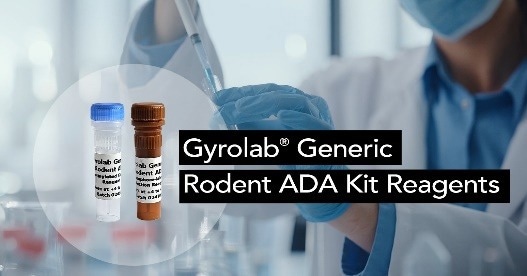Gyros Protein Technologies AB, a pioneer in automated nanoliter-scale immunoassays and a leading provider of peptide synthesizers and reagents, today announced the introduction of Gyrolab® Generic Rodent Anti-Drug Antibody (ADA) Kit Reagents for the detection of circulating immune complexes of human IgG with rodent anti-human IgG. Validated for use with mouse and rat samples, the Kit Reagents provide a ready-to-use solution to accelerate screening of biotherapeutic drug candidates during preclinical development, enabling immunogenicity assessment of drug candidates without the need for drug-specific ADA assay development.
 Gyrolab Generic Rodent ADA Kit Reagents. Image Credit: Gyros Protein Technologies
Gyrolab Generic Rodent ADA Kit Reagents. Image Credit: Gyros Protein Technologies
The new Kit Reagents expedite bioanalysis by removing the need for assay development and optimization across molecules to provide robust, reproducible, reliable data from nanoliter sample volumes. This is beneficial when ADA assessment is evaluated in preclinical animal models where sample volume may be limited.
Monitoring of ADAs is essential in preclinical studies. Multiple drug candidates are often evaluated in parallel using a small number of animals to provide understanding of clearance profiles and safety or efficacy issues resulting from immune complex formation. The Gyrolab Generic Rodent ADA Kit fills an industry-wide need for a generic assay solution to expedite immunogenicity assessment.
The new bioanalysis kit is optimized for use on all Gyrolab systems and complements the Company’s existing portfolio of ready-to-use kits and solutions for pharmacokinetics and toxicokinetics. Following the introduction of Gyrolab Generic Cyno ADA Kit Reagents, the Gyrolab Generic Rodent ADA Kit Reagents further expand the utility of the Gyrolab platform into earlier drug screening and preclinical phases of development. Automation with Gyrolab systems reduces variability due to manual pipetting and speeds up workflows by generating 96 data points within 80 minutes, helping to accelerate the development of novel human IgG therapeutics. Additionally, the Gyrolab platform supports the development of drug-specific ADA assays in the later stages of drug development, using automated acid dissociation in the Gyrolab Mixing CD 96 and the dedicated Gyrolab ADA Software, enabling immunogenicity assessment all the way from discovery through every phase of clinical analysis.
The addition of the Gyrolab Generic Rodent ADA Kit Reagents to our portfolio enhances our offering of ready-to-use kits and solutions for use in drug screening and preclinical development. Complementing our existing kits such as the Gyrolab Generic Cyno ADA Kit Reagents for use in non-human primates and our extensive offering in the pharmacokinetic and toxicokinetic bioanalysis space, our open Gyrolab platform provides a powerful tool to accelerate immunogenicity assessment at the preclinical stage."
Mark Vossenaar, General Manager, Biopharmaceutical Development Division, Gyros Protein Technologies